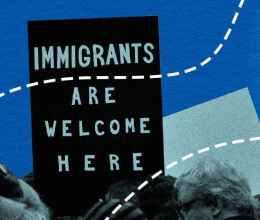
*Name has been changed to protect identities
Just days after Donald Trump’s first inauguration, Sarah* and Matt* rushed to City Hall to get married, not because of romance or tradition, but because they were terrified. A recently-signed executive order that came to be known as the “Muslim Ban” signaled to them that the administration would wage war on immigrants. In fact, that war had already begun.
“I never thought about marriage as a necessity,” Sarah explains. “But once Trump was elected, my knee-jerk reaction was to protect [Matt.] I thought marriage might give me some power. At least I could ask where he was if he got detained.”
Sarah, a U.S. citizen, and Matt, who is undocumented, met in the early 2000s. Their friendship grew over shared experiences and conversations, especially during a stretch when Sarah left the country to visit relatives and realized that, before coming to America, Matt had lived in a similar area as her relatives. Their connection, forged long before Matt’s immigration status became a threat, turned into a committed partnership.
After Trump took office, the stakes changed.
Being married to a U.S. citizen does not protect an undocumented person from being deported or detained. Even attempting to pursue legal status involves navigating a punishing and expensive bureaucracy.
“You have to qualify for a [hardship] waiver and then you have to leave the country for an interview. [Nothing is] guaranteed. It’s all a gamble—and a very costly one,” Sarah says. “We didn’t realize how high the bar was, or how many roadblocks were ahead.”
Matt has lived in the U.S. for more than 20 years. He pays taxes with an IRS-issued Taxpayer Identification Number (TIN). “Since day one,” he says, “I’ve done what’s right. But none of that matters. With Trump [there’s now a] target on my back. It’s no longer about whether I’m ‘good’—it’s about when [the immigration agents] come for me.”
Reality for Sarah and Matt is a constant, grinding anxiety. The threat isn’t just deportation, but unlawful detention. “Our worst fear is being separated,” Sarah says. “The detention system is designed to exploit people. Bodies are now a commodity.”
After they were married, Sarah and Matt applied for what’s known as a hardship waiver, which allows an individual who is otherwise inadmissible to the U.S. to pursue legal citizenship if they can prove that their removal would cause extreme hardship to a U.S. citizen family member. To qualify, they were forced to submit extensive documentation, go through biometric screenings and provide Sarah’s medical records. Giving the U.S. government this much information on them without the guarantee their waiver may be granted has only deepened their vulnerability.
“You give them everything—bank accounts, personal history—and in the end, all it does is make you easier to find if they decide to take you,” Sarah says.
Their plans—going back to school, building a future—are suspended. Every ounce of energy goes into staying safe, navigating bureaucracy, and advocating for others in similar situations.
“There’s no plan,” Matt says. “We just take it day by day. If I leave the house, I wonder if I’ll come back.”
Even basic employment is now difficult. Without a work permit, Matt can’t get a stable job, even though he’s worked multiple jobs for years to support his family.
“People don’t understand,” Sarah says. “There is no visa for a dishwasher. There’s no path for the people doing the essential work that keeps this country running.”
Sarah tried to secure “parole in place” status for Matt—a policy that allowed undocumented spouses of citizens to apply for work permits without risk of raids. It was swiftly shut down after political opposition.
“It makes me resentful when people claim immigrants are here to steal jobs,” Matt says. “I didn’t come here to take anything. I came here because it was my last choice. Either I migrate somewhere or I end up dead or jailed in my home country.”
Sarah adds that, in her experience not just with Matt, but with others in their community, it’s become clear that the “system is designed to exploit. You’re good enough to pay taxes and into social security, but not good enough to be protected or have rights. That’s the trap.”
"You’re good enough to pay taxes and into social security, but not good enough to be protected or have rights. That’s the trap.”
Sarah and Matt’s story is a reminder that the immigration system in the U.S. is more punitive than probative. Matt has consistently attempted to find legal paths to citizenship and has been consistently denied. Sarah has consistently advocated for her partner but, in a political climate where immigration is a wedge issue, she fears that scapegoating, racism and discrimination now defines U.S. policy.
“All we want now is peace,” Sarah says. “We just don’t want to be terrorized by our government. They’re stealing our time, our quality of life. It’s hideous."



